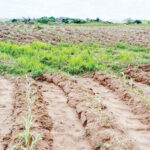“Fertiliser is just one of our problems.
“For me, the major challenge is getting good seeds and agrochemicals to control weeds, diseases and pests.
- NSIA investments in fertiliser projects to hit N221bn
- We don’t have access to fertiliser, inputs – Female farmers lament
“You can manage a farm without fertiliser but you can’t manage a farm with weeds and bad seeds.
“The loss can be 85 per cent compared to 35 per cent yield drop due to absence of fertiliser,” said John Danladi, a smallholder farmer in Jankasa in Karu Local Government Area of Nasarawa State.
His major concern with other inputs is the cost of seeds and agrochemicals.
“They are now expensive and sometimes they are very ineffective as the case with the herbicides I used this year,” he said.
Like John, COVID-19 has brought pains to many smallholder farmers as the lockdown measures adversely affected rural economy; cutting down their ability to farm this year.
Mrs. Talatu Audu spent N16,500 on groundnut seeds she bought from an open market near Garaku in Kokona area of Nasrawa State.
After planting, erratic rainfall and excessive heat caused many of the seeds not to germinate and the money to buy another batch is a huge challenge.
She said: “Draught-tolerant seeds would have helped if I had access to them. But the cost I was told could go up to N50,000 to cover my farm.
“Where would I get that kind of money in this period of corona?”
In Bwari Area Council of the FCT, smallholder maize farmers who are not benefiting from any of the Federal Government interventions, lamented that they did not have the resources to buy quality seeds and agrochemicals because of COVID-19, adding that the cost of some hybrid maize seeds and herbicide was beyond them this year.
Yakubu Azhin has a hectare where he cultivates maize in Garam village near Bwari.
He said the herbicides he bought at N3,000 per 1 litre last year is now about N4,000 and that he needed three to four litres to cover the farm.
However, his attempt to change to a cheaper one landed him in trouble.
“There are so many fake chemicals in the market these days. I bought one at N2,000 and it did not work at all.”
Dr. Tunde Faturoti, the CEO of SEEDCO Nigeria, producers of some of the hybrid maize seeds, told this reporter in Abuja that they had enough stock of hybrid seeds to meet farmers’ needs across the country.
He said despite COVID-19, they had been able to supply seeds to their major dealers across the country, adding that the hybrid maize they had could give a farmer up to seven tonnes per hectare under good agronomic practice.
Also, the National Agricultural Seed Council (NASC), an agency of government regulating the seed sector, said it had worked with seed companies to distribute about 81,000 tonnes of various seeds to farmers this season.
The Director General of NASC, Dr. Philip Ojo, told journalists in Abuja, that despite the restriction of movement, lockdown measures and curfews to control the pandemic, farmers would have unrestricted access to quality seeds.
However, the problem for many smallholder farmers is not just availability, but affordability, because the pandemic has affected many farmers’ income.

 Join Daily Trust WhatsApp Community For Quick Access To News and Happenings Around You.
Join Daily Trust WhatsApp Community For Quick Access To News and Happenings Around You.


